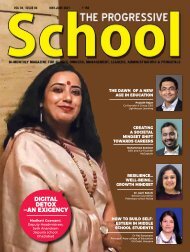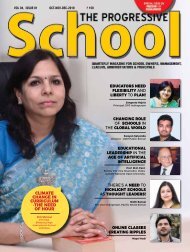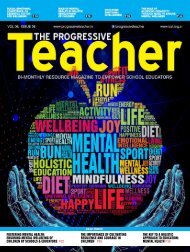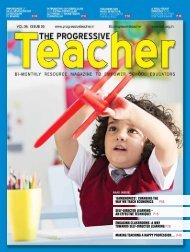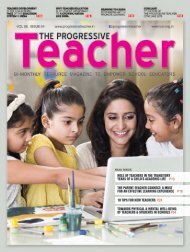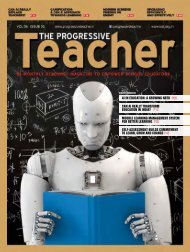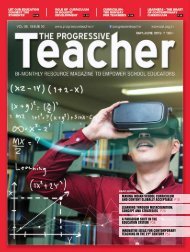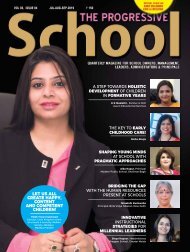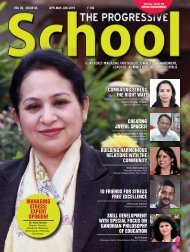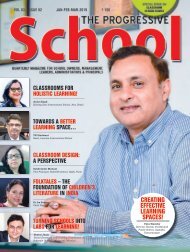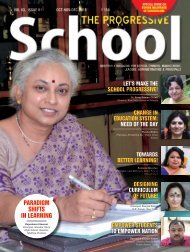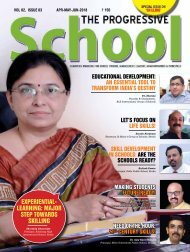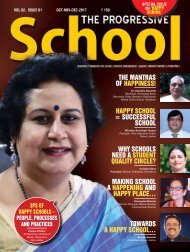The Progressive School Vol 02 Issue 04
The Progressive School is a quarterly magazine for school owners, leaders and principals. It will continue to address vital issues that impact the emerging challenges in the design, administration and growth of schools in all its dimension.
The Progressive School is a quarterly magazine for school owners, leaders and principals. It will continue to address vital issues that impact the emerging challenges in the design, administration and growth of schools in all its dimension.
You also want an ePaper? Increase the reach of your titles
YUMPU automatically turns print PDFs into web optimized ePapers that Google loves.
mentors perpetually work with the same<br />
students for a continual period of time<br />
thus acquainting themselves with each<br />
child’s learning style. This proves to be<br />
of great advantage when mentors moil in<br />
raising their (students) level of performance<br />
in order to procure remarkable results.<br />
In other words, informal teacher is child<br />
oriented and not teacher centered.<br />
For instance, if a lesson is to be<br />
delivered in class, the facilitator may cite<br />
some videos o be watched on the eve of<br />
the presentation. This takes the form of<br />
pre-learning as students get acclimatized<br />
to some main concepts pertinent to the<br />
assigned topic. During the course of the<br />
presentation, students could query their<br />
peers and elicit varied responses from<br />
them to check their previous knowledge.<br />
This eventually progresses into fruitful<br />
group discussion where the focal point is<br />
student learning than teacher teaching.<br />
Thus students become sensitized to the<br />
allotted topic much prior to the teaching<br />
of the same.<br />
TPS: With a high thrust on competitive<br />
learning, most schools appear to<br />
have neglected or marginalized such<br />
vital requirements and appear to be<br />
promoting rote learning preparing the<br />
students for a rat race. In this context<br />
what do you think are the future<br />
challenges and how do you think<br />
schools can cope with them?<br />
Prof Abubaker: <strong>School</strong>s promote rote<br />
learning because the Indian system of<br />
education places thrust on high percentage<br />
marks. Entry into the competitive medical<br />
field or engineering course demand for<br />
soaring scores without probing into the<br />
positive and negative effects<br />
of learning on the learner.<br />
India is single-mindedly<br />
striving to become a<br />
well equipped nation in<br />
terms of infrastructure,<br />
business and<br />
Prof M Abubaker<br />
literacy, for which we need to have an<br />
adept and apt workforce. Children who<br />
learn through the rote method are doomed<br />
to flunk at the very beginning. <strong>The</strong>refore it<br />
has to be made mandatory that students<br />
in every nook and corner of the country<br />
have an exposure to both comprehensive<br />
and constructive education, which should<br />
enable them to apply all that they learn in<br />
their daily lines and this would certainly<br />
add value and meaning to what was learnt.<br />
TPS: Many schools believe that<br />
provision of informal supports to<br />
learning for extended and impactful<br />
learning comes with a cost which<br />
parents cannot afford and hence find<br />
it convenient to marginalize them.<br />
Is there a scope for integrating such<br />
learning experiences with curricular<br />
architecture and how do you think<br />
this can be done?<br />
Prof Abubaker: Formal<br />
teaching often takes place<br />
solely in the classroom where students<br />
work through prepared material over the<br />
course of an academic year. Moreover,<br />
projects may be assigned that require<br />
students to interact with the real outside<br />
world and its people.<br />
TPS: “Learning Beyond” is<br />
fundamental to “Learning Always”<br />
and “Lifelong learning.” It is<br />
development of a mindset and attitude<br />
to learning which is required for a<br />
vibrant knowledge society and a<br />
global learning environment. How<br />
can this idea be seeded in the young<br />
minds which would trigger them to be<br />
powerful ‘self-learners’?<br />
Prof Abubaker: Self-learning can be<br />
as diverse as simply discovering new<br />
information and thinking critically about<br />
it or actively participating and contributing<br />
to a learning community, or designing<br />
one’s own learning path and selecting<br />
resources, guides and information.<br />
TPS: In a world haunted by technology,<br />
most learners spend their time with<br />
the instruments of technology for<br />
further and extended learning. What<br />
are its advantages and shortfalls?<br />
How do you think this mindset<br />
can be changed to a positive and<br />
personalized interactive social<br />
learning culture?<br />
Prof Abubaker: Technology is a man<br />
made creation and not vice versa. <strong>The</strong> use<br />
of technology would be purposeful and a<br />
boon to the society only if students are<br />
guided in its proper sense. Technology<br />
and its use should be rightly targeted, so<br />
that this man made creation turns out<br />
to be beneficial and nifty not only<br />
to the existing generation but<br />
also for the generations<br />
to come.<br />
www.progressiveschool.in<br />
JUL-AUG-SEP 2018<br />
THE PROGRESSIVE SCHOOL<br />
33




